- Home
- Irvine Welsh
Crime Page 36
Crime Read online
Page 36
Yes, it was true. Trudi shares a simultaneous notion with him: Ray Lennox is stunted in his emotional growth. Part of him will always be that fearful little boy in the tunnel. The rest, the kick-boxing, the policework, the hunting of nonces, it’s all a futile attempt to negate that. As long as he has to do the job, he’s stuck in that mode. He has to let it all go.
I have to let it all go.
She can feel the frightening honesty bursting from him, compelling her to mirror his behaviour, to confess, to start their married life with a clean slate. The real-estate guy; I need to say …
They leave the café in silence. Lennox wants to stop off at a Walgreens for some unspecified reason, and Trudi is disconcerted when he emerges with a small can of gasoline. They go back down Lincoln but he swings left at Meridian Avenue and they walk up a few featureless blocks. — Where are we going, Ray? Trudi asks in mounting concern.
— It’s not too far, Lennox says, as the art deco district starts to thin out, building slowly into north Miami Beach’s high-rise condo land. Passing the Convention Centre, the girls struggle in the heat to match Lennox’s driven stride.
But Tianna Marie Hinton suddenly remembers how she likes to walk, loved to walk in Mobile, and she’s in keen pursuit of him, feeling her feet hit the ground and arms swing, her essence rising up through her body. Not buried so deep inside her that the conquerors of her flesh would never be able to dig it out, but rippling and crackling around her in the heat and light. She thinks of what Ray said about Hank Aaron and the plate smashers in the restaurant. Fuck those assholes! Trudi Lowe, inspired by the girl’s reanimation, quickens to keep pace.
Then, when they cross 19th Street, a startling sight greets them; to their right, a huge green hand rises into the air. At first it seems as if it belongs to a drowning body, but its reach into the azure sky is as defiant as it is pained. What initially appears to be a tangle of weeds wrapped round its wrist, is, on closer examination, a confused knot of life-sized human bodies, all undernourished and writhing in agony. Drawing closer, an impending sense of something tumultuous crackles in their bones and the air around them. The hand sprouts out of an island in the centre of a pond cut into a flagstoned plaza. As they walk on to the paved area, a statue of a weeping mother and two children ambushes them, with the slogan on the wall behind the petrified family reading: ‘Then in spite of everything I still believe that people are good at heart.’ The quote is attributed to Anne Frank.
A guard in uniform, with the uncompromised skin tone and features of the African rather than African American, sits outside a booth in the sun. Traffic seems to rumble up Meridian Avenue in a hushed reverence. Palm trees, still and solemn, tower over the pond, which is semicircled by foreground pillars interspersed with white-blossom plants, forming a canopy over a marble wall, stark and candid as bone. On this edifice, vandal-proof words and images are engraved, conveying the story of the Holocaust. A blackboard nothing can whiten, deface or erase; a library of last resort. Then there are the names: hundreds, thousands, millions of them: the adults and the children who perished in the death camps.
An enclosed bridge splits the crescent, and leads to the island and the green hand. Inside the tunnel, the names of the camps, household ones like Auschwitz and Buchenwald, sit mounted in blocks in the wall alongside ones Lennox hasn’t heard of before: Belzec, Ponary, Westerbork.
Unlike the other tunnel branded in his memory, slats of sunlight cut through this one like lasers, pouring in from the spaces above. At the other end they are greeted on the island by more withered green figures and yet more names, etched into another, inner marble circle. Lennox looks at the family names, so many young lives wiped out. He wonders if it ever occurred to the Nazis and those who served them that they were working for a giant child-abuse ring.
— I need to talk to Tianna, Lennox says to Trudi. — You understand? he asks both of them.
— Okay … Tianna says, — … but Trudi can come too.
— We all make mistakes, Ray. Trudi looks warily at him. — We all … She falters and thinks of that stupid night, looks down on the grassy knoll by the path, hands bunching into fists, ready to say something, but when she lifts her head she sees he’s moved away and is walking sombrely out of the memorial, through a gate, with Tianna alongside him. Trudi’s first impulse is to follow but something overrides, freezing in her synapses, rooting her to the spot. Dangerous thoughts stampede within her. Ray and Tianna had spent all that time alone. People did strange things alone. He’d been abused and never, ever told her this dark secret. What other secrets did he have?
Trudi Lowe is suddenly frightened. She sets off in pursuit of her fiancé. Wonders if she knows him any more than the facade, any more than she knew that smiling, toothsome real-estate man in that night of tortured fantasy. How well can we truly know others when we only see them through the lens of the self? She turns into the gate. The sun stinging her face like a peeling cosmetic mask left on too long. In the gardens she squints but can’t see Lennox or Tianna. The air is still and dense with heat.
Then she stumbles into a clearing, and to her relief, they come into view and have stalled by a bench. She hears Lennox say to Tianna, — Remember when those scumbags gave you stuff to make you sleepy, and then mucked about with you, on the boat. You remember, don’t you?
Listening intently, but keeping her distance, she hears Tianna’s faltering words: — Yes. I thought it was a dream, but it wasn’t no dream, she says. — Starry gone and drove me there. They gave me roofies, or something. I keep dreaming about him, that Lance Dearing, touching me … I thought they was dreams and that I was dirty for having them … Dearing said he was a cop and that he’d know if I’d been a bad girl, and that he could put away bad people … he’d know if I was dirty …
— No, not you. You’re not dirty. It’s them. These people are paedophiles. They’re nonces. What do you do when somebody tries to touch you, or says dirty things to you?
— You walk away, or you run away, she says, chewing on her bottom lip.
— Aye. And you tell them to fuck off, he says, and now Lennox trembles as he can see that sweaty prick in his face, feel the taste of it in his mouth. Touches the bristle under his nose. Grown to cover his lip. To put turf on the pitch. Scare away the beasts. The moustache that said, a little too desperately: I’m a man. — You say: fuck off, ya dirty fuckin stoat!
— Fuck off, Tianna shouts. — Fuck off, you dirty fucking stoat!
Trudi approaches them, touches his arm. It’s as stiff and unyielding as a bus stop. — Ray … Lennox turns and looks at her in pain and what she thinks is accusation. He knows. That guy I went with. He knows. He can tell.
Then he sharply turns back to Tianna. Trudi’s aware that he’s formed a terrible bond with this young girl, one that she can never share. — That’s right. Fuck off, you tell them, her policeman fiancé says. — Fuck off, ya dirty fuckin beast. And you shout and scream, he urges, — from the bottom of your lungs. You make people listen, you make them hear, right around the world, and Ray Lennox closes his eyes and he can see the men in the tunnel, the men that pulled him into this strange and terrifying world, who made him a cop, and Gareth Horsburgh and Lance Dearing, Johnnie and Starry, as he bellows a primal roar from the pit of his stomach and the depth of his soul in denouncement of all the tricksters and bullies and pervert beasts he or anyone else would ever encounter: — FUCK OFF, YA DIRTY NONCE!
His roar echoes and shakes around the still and peaceful garden. An elderly man and woman walking along a path jump back in alarm, and quickly retrace their steps.
— Ray, we need to go, Trudi says, but now Tianna is screaming manically along with him: — FUCK OFF, YOU DIRTY FUCKING NONCE, AND LEAVE ME ALONE!
Lennox seizes at the air, his gulps like punches. It’s time to get rid of it; to start expunging the black leaves and dead water that fill his heart. To stick with that process, no matter how long it takes. They shout together until they are breathless. Then Trudi p
uts her arm round the sobbing girl’s shoulders. — Ray, we have to go now!
— Wait. A panting Lennox raises his palm, looks at Tianna, then takes her smaller hands in his. — They had a list, these nonces. It’s a list of the kids they were planning to hurt. To get at through their mothers, like they tricked Robyn. The police have a copy of it, he says, as he tugs a sheaf of white papers from the backpack. The sun blasts off them in dazzling reflection. He takes out the can of gasoline and pours its contents over them. He sets the soggy papers down in an empty steel-framed garbage basket. — Now this isn’t the right thing tae do, not in a park, but on this occasion it’s justified.
Tianna nods as Lennox clicks open a lighter. Trudi looks nervously around. He catches her objection. — We have to do this one thing.
Anger surges through her. — There’s always one thing, Ray! Trudi grabs his shoulders and shakes them in exasperation. What does he want? To tell him that he caught one of Britain’s most notorious child killers or broke up a paedophile ring spanning three American states would be offensive to his ears. He will only ever see the Britneys, Tiannas, Leses and his own younger self he’s been unable to protect. He is a man who will always define himself by his failures. — Then what? Then what do we do? What do you do?
— Then we … Lennox breaks into a slow smile, — then we go back to the hotel and I give my mother a phone, he says, — and I tell her I’m sorry. He rubs his face, his breath catching. — Then I get a shave.
Trudi swallows stiffly, filling herself with Ray’s brown eyes, misty with self-reproach, nodding her head slowly in acknowledgement.
— This is all that’s left of them, Lennox tells Tianna, looking at the papers in the trash basket. — Your mum’s put them all away where they’ll never get at you; Vince, Clemson, Dearing, Johnnie and loads of others like them. It’s rubbish, cause that’s what they are, and he hands her the lighter. — Burn it. Go on. Burn the bastards.
Trudi, jaw clenched, sucks some air in through her teeth.
Tianna looks at him, then the papers; her eyes now in iron focus. She takes the lighter and crouches, smoothing out her dress over her knees. At first it’s hard to see the flame in the bright sunlight, it’s only when she feels the heat on her hand and pulls it away that she realises she’s achieved ignition. They watch the papers warp and blacken for a bit, then in a silent procession, leave the gardens together.
Exiting the park, they head through an adjoining floral-wrapped iron gate, back to the Holocaust memorial. They return to the crescents of marble and the concourse of paving stone in front of the green hand. On Meridian Avenue, the traffic is now busier. Yet Lennox still has to look up at the blue sky and the apartments across the street with their verandas, in order to realise that he isn’t standing in a field in Poland. In fact, across the road is the Miami Beach Chamber of Commerce, which has its own visitors centre.
Tianna’s crying has intensified; her slow, halting sobs are breaking into loud wails. Then it dawns on him, from Trudi’s concerned reaction, that tears are streaming down his own face. He looks at Tianna and sees Britney Hamil, in that striking photograph, the one that found its way on to the cover of every newspaper in Britain. — I’m sorry I wasn’t there for you, he says miserably.
Trudi is about to speak, but Tianna beats her to it.
— You were, Ray. You were the only one who ever was, she cries, embracing him, and he sees that this is a different child, from the other side of the world. And this one was alive as all children should be. He’s thinking of why we have stories, songs and poems; why we’ll always have aspirations for something we call love. And now he sobs in unison with her, in pain, but also infused with a simple gratitude for being free, clear and present, underneath a big green hand in the Florida sun.
Acknowledgements
MUCH LOVE TO Elizabeth, as always, for the emotional and practical assistance (research, driving me all over the Sunshine State and telling me my first draft was crap). Big thanks again to Robin, Katherine, Sue, Laura and everybody else at my publishers for their (apparently endless, but I won’t push it) indulgence of me.
A shout of appreciation to my fellow Scottish pensmiths, Andy O’Hagan and Alan Warner, for unintentionally inspiring this title during a relaxed drink in one of my favourite hostelries in Wicker Park, Chicago. To Mike and Dawn Quinn of Punta Gorda, Florida, for their kind hospitality as well as their willingness to share their local knowledge of south-west Florida. To John Gee, John Hood and Janet Jorgulesco, three native South Floridians who helped this Edinburgh chap feel at home in Miami.
I chose, for obvious reasons, not to research this subject on the Internet. Instead, I limited my sources to published papers in academic, social work and clinical psychology texts, as well as self-help material. I spoke to survivors of childhood sexual abuse; their tales were as harrowing as their courage and strength were inspiring. One UK book that I found particularly invaluable as a starting point and continual reference was Breaking Free: Help for Survivors of Sexual Abuse by Carolyn Ainscough and Kay Toon. While I respect their obvious need for anonymity, I have to record the generosity of some police officers and social workers in the states of Illinois and Florida who gave time and information on the modus operandi of organised sexual abuse rings, and their help was greatly appreciated.
Eternal gratitude to the usual mobs in Edinburgh, London, Dublin, Chicago, San Francisco and elsewhere. Everybody who has either praised or slagged me: thanks for taking the time to care. For those who are indifferent: much gratitude for leaving me in peace.
Bologna, FLA, is a construct of my imagination. I drew heavily on the south-west Florida towns of Naples, Punta Gorda and Fort Myers as physical inspiration for this composition.
Sadly, in real life, the greatest of ills tend to happen closest to home. Most abuse of young persons – sexual or otherwise – takes place within the family or the community. Organised underground sex-abuse groups and cults, while disturbing and headline-grabbing, are not a widespread problem in modern society. This book, as a work of fiction, does not mean to imply that they are.
Irvine Welsh, Miami Beach, Florida
This ebook is copyright material and must not be copied, reproduced, transferred, distributed, leased, licensed or publicly performed or used in any way except as specifically permitted in writing by the publishers, as allowed under the terms and conditions under which it was purchased or as strictly permitted by applicable copyright law. Any unauthorised distribution or use of this text may be a direct infringement of the author’s and publisher’s rights and those responsible may be liable in law accordingly.
Version 1.0
Epub ISBN 9781407018041
www.randomhouse.co.uk
Published by Vintage 2009
2 4 6 8 10 9 7 5 3 1
Copyright © Irvine Welsh 2008
Irvine Welsh has asserted his right under the Copyright, Designs and Patents Act 1988 to be identified as the author of this work
This book is a work of fiction
This book is sold subject to the condition that it shall not, by way of trade or otherwise, be lent, resold, hired out, or otherwise circulated without the publisher’s prior consent in any form of binding or cover other than that in which it is published and without a similar condition, including this condition, being imposed on the subsequent purchaser
First published in Great Britain in 2008 by Jonathan Cape
Vintage
Random House, 20 Vauxhall Bridge Road,
London SW1V 2SA
www.vintage-books.co.uk
Addresses for companies within The Random House Group Limited can be found at: www.randomhouse.co.uk/offices.htm
The Random House Group Limited Reg. No. 954009
A CIP catalogue record for this book is available from the British Library
ISBN 9780099506980
/>

 If You Liked School, You'll Love Work
If You Liked School, You'll Love Work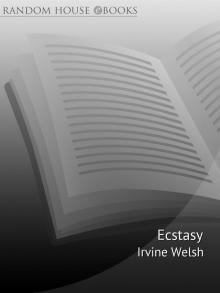 Ecstasy: Three Tales of Chemical Romance
Ecstasy: Three Tales of Chemical Romance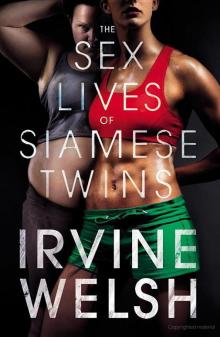 The Sex Lives of Siamese Twins
The Sex Lives of Siamese Twins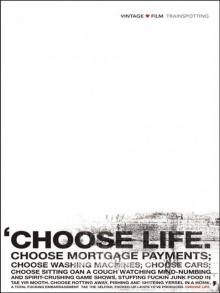 Trainspotting
Trainspotting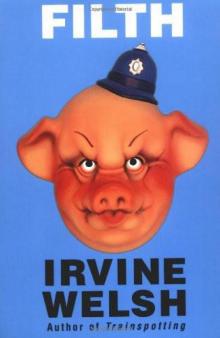 Filth
Filth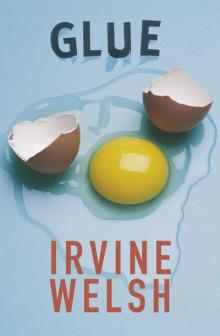 Glue
Glue Marabou Stork Nightmares
Marabou Stork Nightmares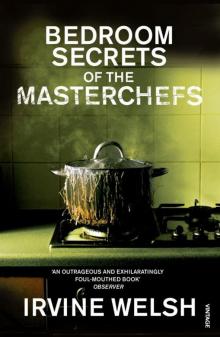 The Bedroom Secrets of the Master Chefs
The Bedroom Secrets of the Master Chefs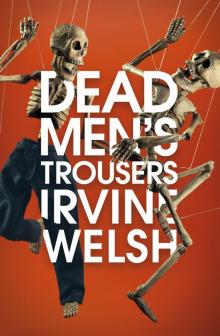 Dead Men's Trousers
Dead Men's Trousers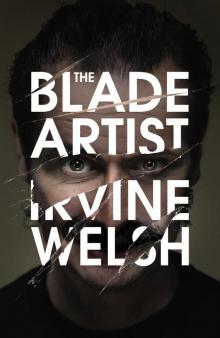 The Blade Artist
The Blade Artist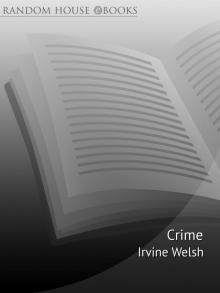 Crime
Crime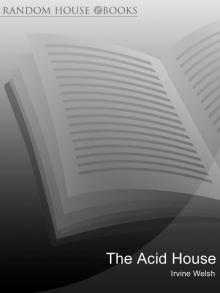 The Acid House
The Acid House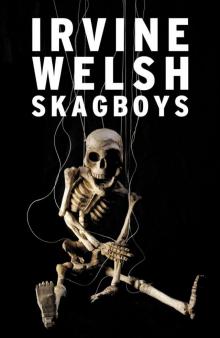 Skagboys
Skagboys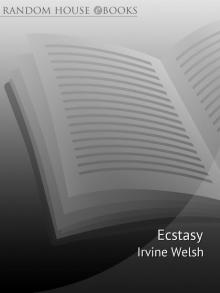 Ecstasy
Ecstasy